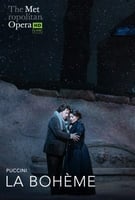The Sound of Revolution The church bells of Rome toll softly at dawn. A painter kneels in prayer, a...
La Rondine by Puccini — Flight Toward Freedom
 The Dream of a Different Life
The Dream of a Different Life
It begins not with thunder or tragedy, but with a sigh — the kind of sigh that comes from a woman who has everything except what she truly wants. In La Rondine (The Swallow), Giacomo Puccini gives us Magda: elegant, self-possessed, and quietly yearning for something real in a world that prizes illusion. Her Paris salon is filled with laughter, flirtation, and champagne bubbles, but beneath the glitter, a question lingers — what if love, the kind that demands sacrifice, is worth more than luxury?
This isn’t the Puccini of Tosca’s knife or Turandot’s gong — it’s a more delicate, wistful composer at work. La Rondine, completed in 1917, floats somewhere between operetta and opera, a lyrical meditation on love and self-discovery wrapped in waltz rhythms and moonlit duets.
A Different Kind of Puccini Story
Commissioned by Vienna’s Carltheater as a light Viennese operetta, La Rondine became instead a hybrid: part Parisian café romance, part Italian lyricism, part bittersweet fairy tale. Political tensions during World War I forced its premiere to shift from Vienna to Monte Carlo, and Puccini — ever the perfectionist — revised it multiple times, never fully satisfied. Critics of the day were puzzled: was this Puccini’s attempt to chase La Traviata’s ghost or his rebellion against grand tragedy?
What remains is one of his most hauntingly beautiful scores. The music flutters like its namesake — a swallow, always in motion, never quite at rest. Magda’s Act II waltz, “Chi il bel sogno di Doretta,” shimmers with an ache that seems to foretell her fate: the dream of perfect love, forever out of reach.
The Story: A Love Meant for Flight
Magda lives as the mistress of a wealthy Parisian banker, Rambaldo — comfortably kept but spiritually restless. At her salon, a young poet named Prunier teases her about romance while singing of Doretta, a girl who dreams of true love. Magda impulsively finishes the song herself, imagining Doretta finding happiness not with a prince, but with a student — a dream that mirrors her own secret longing.
Enter Ruggero, an earnest provincial visiting Paris for the first time. When Magda meets him later at the lively café Bullier (disguised simply as “Paulette”), they fall genuinely, almost naively, in love. The moment feels suspended in time — a Puccinian echo of La Bohème’s youthful tenderness, only this time set in the warmth of spring rather than the chill of a garret.
But reality intrudes. Their idyll in the countryside fades as Magda’s past — and society’s judgment — cast shadows over their happiness. When Ruggero writes home to seek his mother’s blessing for marriage, Magda confesses the truth: she cannot give him a respectable life. In the final scene, she returns to Paris alone, like the swallow of the title — always destined to fly away, never to nest.
Between Sentiment and Satire
There’s a touch of irony in how lightly Puccini treats heartbreak here. Rather than thunderous tragedy, La Rondine ends in quiet resignation. The composer himself once called it “a swallow’s flight toward freedom,” and in that sense, Magda’s departure isn’t defeat — it’s grace.
Today, audiences often note how modern her choice feels. She refuses to be rescued, refuses to pretend, and refuses to accept happiness built on illusion. In an age that still wrestles with image versus authenticity — social media’s glittering salons of self-presentation — La Rondine lands squarely in the present.
The Sound of Elegance and Escape
Musically, Puccini paints Paris in pastel tones. The waltzes sparkle but with restraint; even the café scenes feel more wistful than wild. Magda’s vocal lines are long, arching, and deceptively gentle — written for a soprano with both lyric warmth and subtle control. Ruggero’s melodies are open-hearted and tender, while Prunier’s music crackles with operetta-like charm.
Puccini’s orchestration gleams with dance rhythms, jazz inflections, and hints of Debussy’s harmonic perfume. Listen closely, and you can hear the composer experimenting — reaching toward a cosmopolitan sound world that feels closer to The Merry Widow than Madama Butterfly.
A Rediscovery in Our Time
Once dismissed as a “lightweight” among Puccini’s works, La Rondine has undergone a quiet renaissance. The Metropolitan Opera’s Live in HD broadcast, featuring Angela Gheorghiu and Roberto Alagna, reintroduced it to global audiences who were captivated by its emotional restraint and modern sensibility. Gheorghiu’s Magda — poised, luminous, yet trembling beneath the surface — reminded viewers that sometimes the softest heartbreak cuts the deepest.
In today’s repertoire, La Rondine shines as Puccini’s most elegant paradox: an opera about freedom disguised as a romance, a fairy tale that ends not in despair but in dignity.
Closing Reflection
Like the swallow that gives the opera its name, Magda soars for a moment — gloriously, impossibly — before returning to solitude. And perhaps that’s why La Rondine still speaks to us. It’s not about losing love; it’s about recognizing that love cannot exist without truth.
Opera Insight
Puccini rewrote La Rondine three times — including an alternate tragic ending in which Magda dies — but none satisfied him. He once joked that the opera was “a swallow that never found its nest.” Still, he kept its autograph score on his desk for years, proof that even Puccini could fall in love with imperfection.
Friends of the Opera is dedicated to making opera accessible, educational, and inspiring for everyone in our community. If you enjoy reading the Friends of the Opera blog, including Arias and Insights, please consider signing up for a membership or providing a donation of support: Learn More



